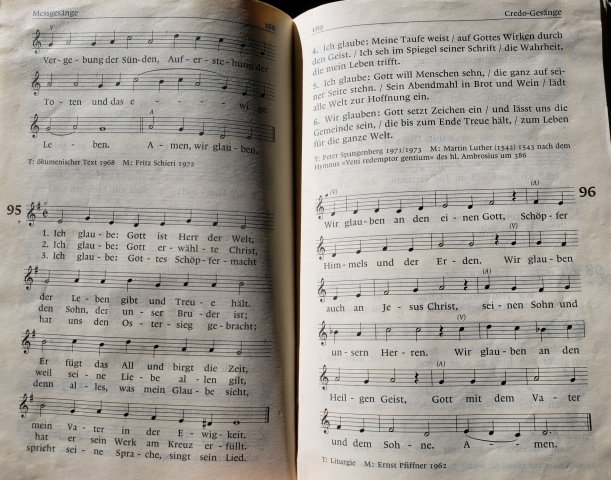When visiting Rome, we prayed in far more churches that I can possibly remember, from the incredible St. Peter's Basilica in the Vatican, to the personal chapel of the popes at the Scala Sancta, to the little churches everywhere on the streets of Rome, each filled with museum-worthy artwork.
But we only attended two services on our trip, both in Switzerland, both official state churches, one Reformed and one Catholic. The way I figure it: on average, we were Anglican.
The first church was just about what you'd expect from a Reformed church: a pulpit, a cross, an organ, and some chairs. Scripture, a long sermon, and a little music (no choir). I'm told there's sometimes more music than we experienced. Of course it was all in German, but it's amazing how much you can understand of Scripture readings if you know the Bible well enough, and we even figured out a tiny bit of the sermon. Singing in German is almost easy if you (1) have the words and the music, and (2) know even a very little bit about German pronunciation.
Our second service was Catholic, and it's not really a fair comparison, because it was a special day for the church, a celebration of the saint for whom it is named. Therefore the music was special, and included the choir, which doesn't always sing for the services. (That's not all bad, as it allows Stephan to sing in the choir and still attend most of his usual church's services.) It's a modern building, but not nearly as bare as the Reformed church.
Once again, we could pick up a little bit of the Bible readings and the sermon, but of course it was mostly lost on us. On the other hand, if only we had been provided with a written transcript of the liturgy, we could have participated in most of it and known exactly what was going on, even if we didn't understand most of the German. It was recognizably very much like our Episcopal (Anglican) service. (To be fair, the Catholics would say the Anglican service is very much like theirs.) At one point, Janet leaned over and asked, "Do you say this at your church?" referring to a part of the liturgy not used in the Episcopal churches of her experience. "We do now," I replied (thanks to our current priest). I could tell you what the priest and people were saying, but I couldn't join in without the German words to read.
Here's one fun hymn (#95) we sang, fun for me because I knew the tune as that of The Glory of These Forty Days. Close enough, anyway. (Click on the image to enlarge.) Note that the Catholic hymnal attributes the music to Martin Luther, while Hymnary.org to Johann Sebastian Bach. It actually is Martin Luther's music, but Bach did base a famous cantata on it.



